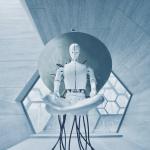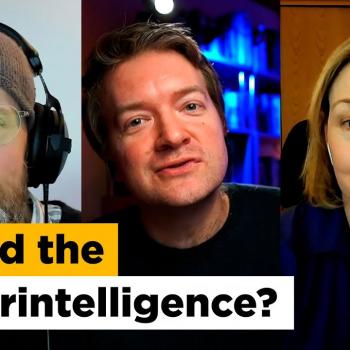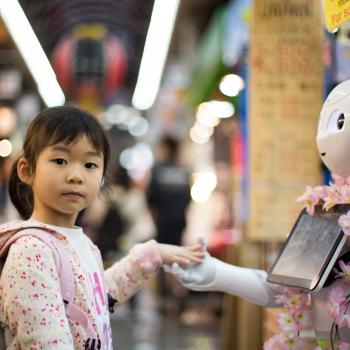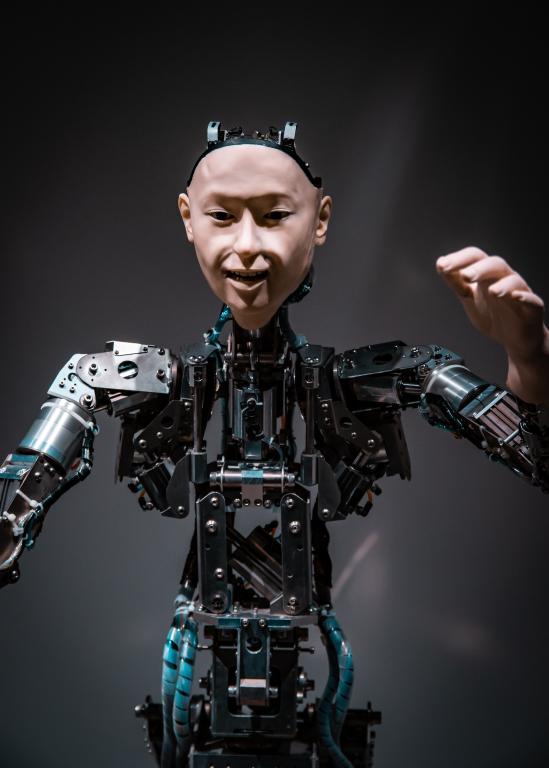 A few days after listening to The Big Conversation episode on the topic of Artificial Intelligence (AI) and humanity featuring Nick Bostrom and Rosalind Picard, I happened upon the oldest of the Psalms, chapter 90, in which Moses gives an on-point contribution to nearly every topic covered in Justin Brierley’s interview.
A few days after listening to The Big Conversation episode on the topic of Artificial Intelligence (AI) and humanity featuring Nick Bostrom and Rosalind Picard, I happened upon the oldest of the Psalms, chapter 90, in which Moses gives an on-point contribution to nearly every topic covered in Justin Brierley’s interview.
An “unbelievable” coincidence? Curiosity drove me to replay the audio and read the passage and its cross-references. As all big conversations should do, I found further correlation and new questions.
Optimistic About AI
Picard shared many positive applications of AI within Affective Computing research, originally created to make technology user-friendly. MIT Media Lab studies of the autism population found that feelings are detectable in every organ of the body. This led to the creation of innovative wearable devices for patients with autism and depression.
Like the internet, AI is at risk for abuse by bad actors, yet Picard is optimistic that constructive augmentations will occur because “we are ontologically superior to that which we make (not which we beget)”. In decades of computational experimentation, scientists have yet to see an inkling of conscious creation.
Bostrom, as founder and director of the Future of Humanity Institute at the University of Oxford, studies the connection between human life and smart machines. He calls himself “a fretful optimist” about the future of AI and its philosophical implications. Our age is unique, progress is running faster than our imagination, and we have very little precedent to draw on. It’s claimed that future AI systems could create a similar architectural consciousness to ours, maybe on the level of a tiny animal.
I believe the 21st Century speed of innovation is reminiscent of an observation made by CS Lewis – that we are not simply using new inventions, we are expecting them to grow up and mature along with us. A grist mill, once built and maintained, is the same for generations. Automobiles become obsolete several times in one life span. Today, software is routinely updated. This raises positive expectations (if a bit entitled) and the potential for serious unintended consequences (human error or malevolence).
Mystery
Before delving into the world of Space Odyssey, we must first posit that there will always be a gulf between materialist neural functions and the wonder that is the human being. The list is myriad but it at least begins with the mystery of Love. 1 Corinthians 13 says we might have all manner of admirable attributes but if self-emptying love is not at the root, we are a clanging gong. In addition, healthy humans also absorb and generate other love such as familial, romantic, friendship. Love implies relationship, which implies accountability.
We humans reproduce ourselves within constant, social, nature and nurture ‘programming’. Childhood sets us up for adult acceptability and survival. We have a universal sense that we should consistently behave in certain ways. Yet, we know that we do not, hence we are morally responsible beings. We look outside ourselves for a straight measure to worship. We need empathetic forgiveness from shared feelings of another through similar body-felt experiences, especially painful ones.
In comparison, AI will always be a clicking computer.

All Knowing
Psalm 90
A prayer of Moses the man of God.
1 Lord, you have been our dwelling place
throughout all generations.
2 Before the mountains were born
or you brought forth the whole world,
from everlasting to everlasting you are God.3 You turn people back to dust,
saying, “Return to dust, you mortals.”
4 A thousand years in your sight
are like a day that has just gone by,
or like a watch in the night.
5 Yet you sweep people away in the sleep of death—
they are like the new grass of the morning:
6 In the morning it springs up new,
but by evening it is dry and withered.7 We are consumed by your anger
and terrified by your indignation.
8 You have set our iniquities before you,
our secret sins in the light of your presence.
9 All our days pass away under your wrath;
we finish our years with a moan.
10 Our days may come to seventy years,
or eighty, if our strength endures;
yet the best of them are but trouble and sorrow,
for they quickly pass, and we fly away.
11 If only we knew the power of your anger!
Your wrath is as great as the fear that is your due.
12 Teach us to number our days,
that we may gain a heart of wisdom.13 Relent, Lord! How long will it be?
Have compassion on your servants.
14 Satisfy us in the morning with your unfailing love,
that we may sing for joy and be glad all our days.
15 Make us glad for as many days as you have afflicted us,
for as many years as we have seen trouble.
16 May your deeds be shown to your servants,
your splendor to their children.
17 May the favor of the Lord our God rest on us;
establish the work of our hands for us—
yes, establish the work of our hands.
In Psalm 90, Moses presents a timeless view of life, from the cradle to the “sigh” of the grave. He opens describing a God who created the world and dwells above it. We can count on that stability (vs 1-2). This God is outside of time, “a thousand years is as a night’s watch” (v 4). Our bodies are quickened from dust (v 3), and we face labor and sorrow every day (vs 10,15).
As ever, we sprout “in the morning” and flourish and decline “in the evening” (vs 5-6). He writes that our life span is 70-80 years (vs 9-10), maybe recognizing that his long life was no longer the norm. Like small children with their parents in the “morning of life”, we desperately want a Creator’s compassion, provision and presence (v 13). We want His pleasure and approval of the work of our hands (vs 17). A “well done, good and faithful servant (Matt 25:21,23)”.
Verse 8b grabs our attention – we were made free to reject a Creator’s love and pay the consequences. “Thou hast placed our iniquities before Thee, our secret sins in the light of Thy presence.” Yet, God still offers return and actively holds back His infinite power, which He justifiably could unleash against us (vs 7-9,11).
The Super Intelligence of the God of the Bible knows us very well. Hebrews 4:13 says: “All things are open and laid bare to the eyes of Him with whom we have to do.” Uncomfortable, but imagine the day when a synthesized, dispassionate, bad actor Artificial Intelligence knows everything about you. From whence could you call for help?
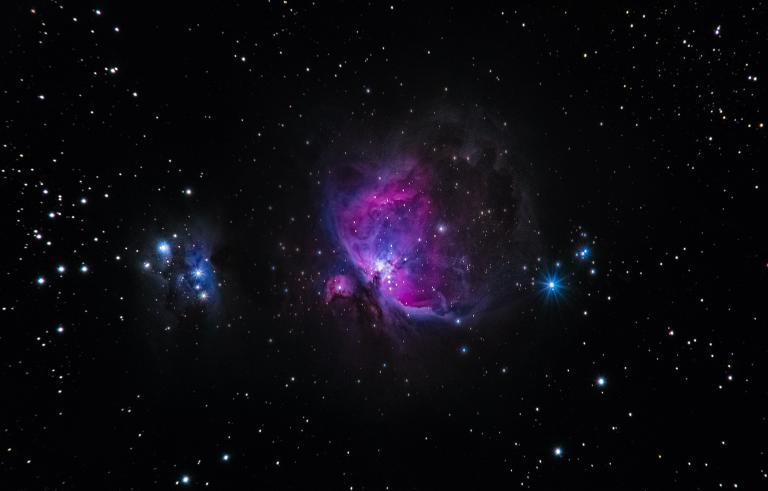
The Supreme Mind
Humans, the Bible teaches, have Jesus as our high priest.
“Let us then approach God’s throne of grace with confidence, so that we may receive mercy and find grace to help us in our time of need.” (Heb. 4:14-16)
Moses wrote in verse 12 that God’s eternal favor and approval is available if we let Him teach us how to recognize and appreciate the number of our days. It is possible “to present a heart of wisdom to Him,” the one who sees every computational misstep. Proverbs 1:7,23 and 4:7 say that the beginning of wisdom is the reverence of the Lord, it is life’s first business, we must get wisdom.
Picard said 1 Corinthians 13:12 is her hope: We are currently behind a veil, we see through a mirror darkly, but in eternity we will be utterly, algorithmically known by the Supreme Mind. She can’t wait to meet Him, like King David who said God was “too high” for him to comprehend, yet he rejoiced that God already knew him from the womb (Psalm 139).
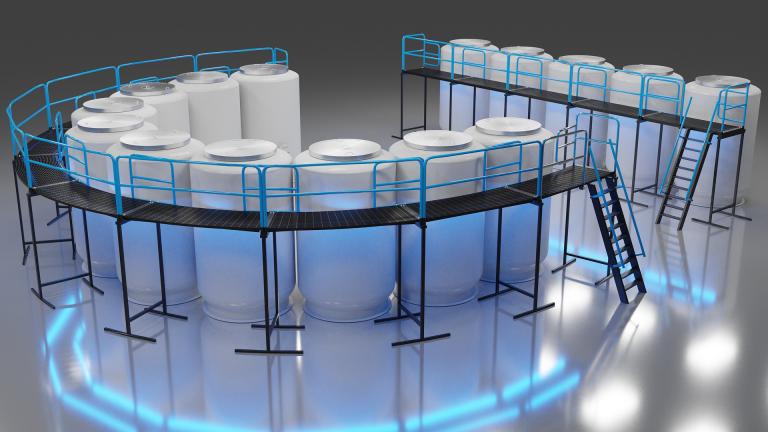
Cryonic Preservation
Things got dicey when host Justin Brierley brought up eternal life and cryonic preservation for future revival. Bostrom is among the few that have signed up, but here he began qualifying conditions. Eternity is a really long time; maybe if one could take a little time to see how it goes? Other once-fringe ideas are commonplace now like simulations and virtual reality games, so maybe hope might be nice.
But we are not simple, little arctic animals returning to a familiar habitat. How would our thawed material live out? Isn’t it hubris to think future people will be glad to have us? Why are we 21st Century people so special? Why return to a world where “man is born to trouble as the sparks fly upward”? On what basis do we think a soul can be frozen? From the mystery surrounding frozen embryos? Isn’t this reminiscent of Egyptian mummification?
Picard asked why humans have always sought to live forever. Why the cosmic homesickness? She quoted Seneca:
“We are like mortals in what we fear and like immortals in what we desire.”
Bostrom referenced the Simulation Hypothesis. There could be layers of simulations. Having done computational mapping, Picard wanted hard data. She detailed the current capability to make functional reality “look-like” affective consciousness. Behind every Simulation project there is always a Purpose and a ‘Mind’ that built the contained environment.
The Sims Video Games creator, Will Wright, told her how he can control the game like a biblical miracle. He can reach in and violate all the Sims’ characters’ physics models. Correlating this to our world, it is reasonable to consider that miracles are evidence for the God of the Bible.
Picard said we must be able to distinguish between evidence, representation and reality. People outside of AI deserve to know what is speculation and what is true. A recomposited synthetic being made from a compilation of texts, videos, emails etc is already possible. But that is not virtual eternal life for the deceased.

Counterfeit Resurrection
Hebrews 9:27 disputes the plausibility of cryonic preservation and future revival: “We are appointed to die once.” The next verse says:
“So Christ, also, having been offered once to bear the sins of many, shall appear a second time for salvation without reference to sin (not dying on the cross again), to those who eagerly await Him (believers).”
An AI creature, if ever possible, will not have a soul or the free will to love or sin. Christ is for us, period.
Despite our desire for control, it eludes us. We can use AI as a tool while being mindful of our limitations. Attempts to game the system have, at root, the besetting frailty of pride.
Click here to watch Professor Rosalind Picard and Professor Nick Bostrom discuss this topic further on The Big Conversation.

